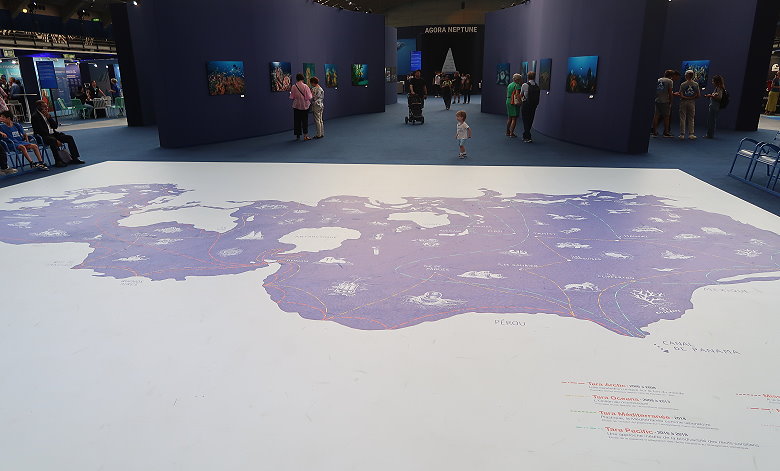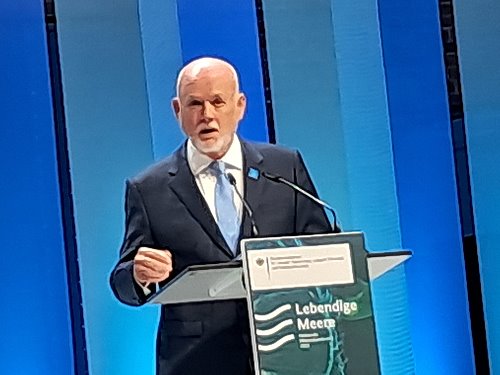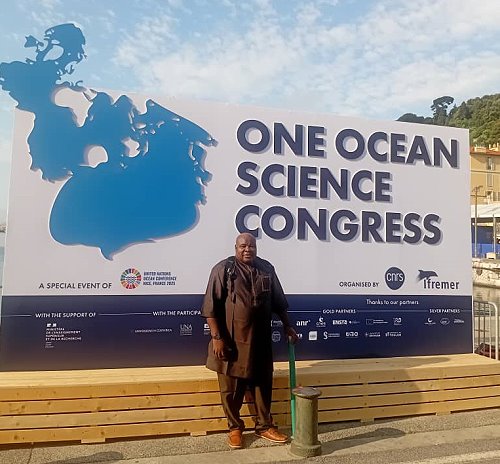The ocean does not only need treaties, agreements, and data: it also needs a common language — a way of naming it that recognizes it as a common good, a space of life, a shared realm that deserves care and respect. In a world strained by ecological crisis, inequality, and the fragmentation of knowledge, building a shared narrative can help generate convergence and concrete action.
The third United Nations Ocean Conference (UNOC3, Nice 2025) has managed to bring together in one space the voices of science, international law, the UN and its agencies — such as UNESCO and FAO — governments, companies, but also indigenous voices and global civil society. This convergence cannot be underestimated: it represents an act of collective articulation, a common horizon in ocean governance understood as a common good of humanity. The installation at the beginning of the public ‘Green Zone’ illustrated the centrality of the ocean for all.

The ocean is a common good not only because of its magnitude or its function in the climate system, but also because of its wider ecological, cultural, economic and symbolic value. The ocean beyond the Exclusive Economic Zones (EEZs) under purview of nation states covers about half of the Earth’s surface and 64% of global ocean area. The lack of agreed rules has led to a massive reduction of biomass – life – by only 8 countries with the technological capabilities. Subsidised industrial fishing is a prime disruptor of ecosystem functions in the areas beyond national jurisdiction as well as within EEZs.

Already during preparatory conferences, Ambassador Peter Thomson, Special Envoy for the Ocean of UN Secretary General Antonio Guterres had emphasised the need to operationalise the agreed treaties and principles
Stopping this exploitation for good will have positive effects on the health and productivity of all marine ecosystems. At the same time the deep ocean is the safest and biggest carbon sink of the planet when marine sediments remain undisturbed from deep sea mining and other exploitation and marine ecosystems are allowed to function naturally.
The protection of the ocean requires articulation between scientific knowledge, political responsibility, legal principles, and shared ethical values. Inter-generational justice, universal human rights, and respect for all forms of life shape an ethic that must guide political action, legal design, the blue economy and scientific research alike.
From this integrative perspective, the goal is not only to proclaim principles, but also to move toward the progressive implementation of three documents of different nature and status, which can and should be brought into dialogue in order to address overboardening priority of short-term economic profits to a limited number of internationally acting companies at the expense of everything else:
- The United Nations Convention on the Law of the Sea (UNCLOS, 1982) — ratified by over 160 states and entered into force in 1994 — has been the legal backbone of ocean governance since its inception. It enshrines conservation, cooperation, freedom of navigation, and, in Part XII, the protection of the marine environment against pollution. However, in today’s context, it proves insufficient to address critical dimensions such as industrial fishing, irregular maritime migration, environmental and climate justice, equitable access to knowledge, or the militarization of the ocean. Therefore, multiple actors are seeking to broaden its interpretation from an ethical, ecological, and social perspective, in line with Agenda 2030, in particular SDG 14 and its linkages to other Sustainable Development Goals.
 The Treaty on the Conservation and Sustainable Use of Marine Biodiversity Beyond National Jurisdiction (BBNJ, 2023), adopted on 19 June 2023, is an essential multilateral instrument. It establishes a framework for conserving and sustainably using marine biodiversity and genetic resources with emphasis on capacity strengthening and fair benefit sharing, creating marine protected areas covering 30% of the areas beyond national jurisdiction by 2030, conducting environmental impact assessments, and facilitating technology transfer. Its approach introduces a methodological and normative shift compared to UNCLOS — one more attuned to contemporary challenges —ending the lawlessness of the areas beyond national jurisdiction and emphasising fair benefit sharing in a broadening of UNCLOS.
The Treaty on the Conservation and Sustainable Use of Marine Biodiversity Beyond National Jurisdiction (BBNJ, 2023), adopted on 19 June 2023, is an essential multilateral instrument. It establishes a framework for conserving and sustainably using marine biodiversity and genetic resources with emphasis on capacity strengthening and fair benefit sharing, creating marine protected areas covering 30% of the areas beyond national jurisdiction by 2030, conducting environmental impact assessments, and facilitating technology transfer. Its approach introduces a methodological and normative shift compared to UNCLOS — one more attuned to contemporary challenges —ending the lawlessness of the areas beyond national jurisdiction and emphasising fair benefit sharing in a broadening of UNCLOS.- The Nice Scientific Manifesto (One Ocean Science Congress, 2025) proposes urgent and specific actions: protecting at least 30% of the ocean, eliminating harmful subsidies often enabling illegal fishing, suspending deep-sea mining until sufficient scientific information is available, phasing out fossil fuels and the plastic deluge they generate in addition to accelerating climate change, freely sharing scientific data, strengthening ocean literacy, and recognizing indigenous and coastal knowledge systems. In this document, science commits not only to observation but also to action.
These three dimensions — legal, ecological, and scientific — converge in a vision of global co-responsibility for a blue economy that is guided by regenerative investments and living within planetary boundaries. In addition, one other fundamental dimension remains to be explicitly integrated: the human vulnerability linked to the ocean. This includes migrants on maritime crossings, fishers and seafarers lacking protections, coastal communities threatened by sea level rise engendered by climate change and privatisation of coastlines by tourism and infrastructure developments, and all others who depend on the sea without being represented in decision-making spaces. Incorporating this perspective means understanding the ocean also as an ethical space, one that deserves full and universal care.
That is why knowledges must become responsible action. This is why the people and communities most directly affected by biodiversity loss, climate change and typically marginalised in decision making processes need to be heard. Their knowledge of local conditions needs to be crossed with system-scale science and political and institutional expertise at national and international levels. Only in this way will it be possible to build coherent governance grounded in ethical principles and the participation of all sectors. Caring for the ocean then means caring for humanity and the entire planet — for all life, for all citizens of present and future generations.
Reflections after UNOC3 by María del Carmen Patricia Morales, Stella A. Williams, Aliou Sall, Marcelo Lino Morales Yokobori & Cornelia E Nauen, members of the Mundus maris board.
Sources:
United Nations Convention on the Law of the Sea (UNCLOS), 1982
Agreement under UNCLOS on the Conservation and Sustainable Use of Marine Biological Diversity of Areas Beyond National Jurisdiction (BBNJ), 2023
One Ocean Science Congress Manifesto, Science for Ocean Action, One Ocean Science Congress (OOSC), Nice, 3–6 June 2025: accessible via IFREMER Forms : one-ocean-science-2025.orgone-ocean-science-2025.org+6odipe.org+6bsky.app+6
